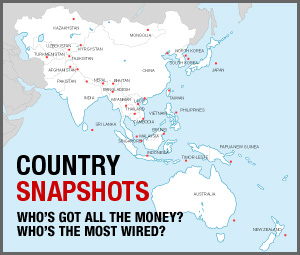Can India be Great? 
 Image: Lyle Vincent
Image: Lyle Vincent
A critical component of one of these disciplines, the study of international relations, is essentially in the doldrums. In a nation of well over a billion people, the country has perhaps a dozen or fewer international relations scholars of international repute and stature. Worse still is the state of area studies at Indian universities. Despite adversarial relations with both the PRC and Pakistan, not one Indian university has a world-class South Asia or China studies program. As a consequence it lacks scholars who might be able to provide policy-relevant advice to India’s decision-makers. Such a paucity of trained academics will inevitably compromise the quality of India’s foreign policy analyses and choices.
Aside from these critical educational shortcomings, the efficacy of India’s bureaucratic apparatus is problematic–or worse. The civil service, which is composed mostly of generalists, is increasingly unequal to the complexity of the tasks that they are expected to perform. Yet few reforms have been enacted to impart the requisite training that would enable them to meet the challenges of governance in a modernizing state. The curricular changes that have been made in their training upon entry into the civil service are piecemeal and incremental. Furthermore, a cadre of less than 5,000 officers constitutes the national work force of the civil service. To compound matters, thanks to India’s recent economic success the civil service, with its limited pay scale, is no longer attracting the best talent available in the country.
These institutional infirmities, in turn, have prevented the country from tackling various on-going social tensions and associated violence with vigour. For example, for the better part of the last decade, a resurgent Maoist guerrilla movement, referred to as the Naxalites, has stalked significant parts of the country. Today it afflicts at least 20 states and some 223 districts across the country. Despite sporadic efforts to tackle this movement, the Indian state has yet to fashion a coherent national strategy to contain and suppress it. Meanwhile, the Naxalites have grown bolder, attacking police stations and various large-scale commercial projects with seeming impunity. Admittedly, India has had ample experience in dealing with insurgents and has managed to cope with a host of insurgencies in its 62 year history as an independent state. Yet the intransigence of this movement poses a genuine threat to foreign investment in the country and therefore to its overall economic well-being.
Finally, the Indian state has yet to come to terms with another growing social cleavage which could prove to be even more consequential for its continued political stability and economic growth. Thanks to the rise of a form of virulent Hindu nationalism in the late 1980s and through much of the 1990s, a small segment of India’s vast Muslim community has turned to the siren call of radical Islam. As a consequence, India, which had escaped the scourge of such Islamic zealotry, now faces the possibility of home-grown terror. There’s evidence, for example, that the Pakistan-based terrorists who attacked Mumbai in November 2008 had received assistance from domestic sources. Unless India’s political class forthrightly comes to terms with this emergent internal threat, its hopes of extending its influence beyond its shores could well be thwarted.
Back to the Future?
It’s said that Charles de Gaulle once mordantly quipped that Brazil is the country of the future and always will be. The same, unfortunately, could be said about India. It has obviously longed to be a great power but has never marshalled the requisite resources with the necessary sense of purpose to make a breakthrough on multiple fronts. As a consequence it has made significant progress in some areas but has remained a hopeless laggard in others. Unless it can summon its human and material resources to tackle the myriad challenges that it confronts, both at home and abroad, its fond hopes of achieving great power status will continue to remain a fleeting mirage.
Sumit Ganguly is a Professor of Political Science and holds the Rabindranath Tagore Chair in Indian Cultures and Civilizations at Indiana University, Bloomington.










